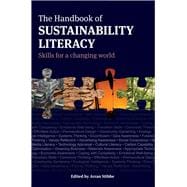
Note: Supplemental materials are not guaranteed with Rental or Used book purchases.
Purchase Benefits
What is included with this book?
| Acknowledgements | p. 8 |
| Introduction | p. 9 |
| Skills for a Changing World | |
| Ecocriticism: the ability to investigate cultural artefacts from an ecological perspective | p. 19 |
| Optimisation: the art of personal sufficiency | p. 25 |
| Grounded Economic Awareness: economic awareness based on ecological and ethical values | p. 30 |
| Advertising Awareness: the ability to expose advertising discourses that undermine sustainability, and resist them | p. 37 |
| Transition Skills: skills for transition to a post-fossil-fuel age | p. 43 |
| Commons Thinking: the ability to envisage and enable a viable future through connected action | p. 51 |
| Effortless Action: the ability to fulfil human needs effortlessly through working with nature | p. 58 |
| Permaculture Design: designing our lives with nature as the model | p. 64 |
| Community Gardening: skills for building community and working within environmental limits | p. 70 |
| Ecological Intelligence: viewing the world relationally | p. 77 |
| Systems Thinking: the ability to recognise and analyse the interconnections within and between systems | p. 84 |
| Gaia Awareness: awareness of the animate qualities of the Earth | p. 89 |
| Futures Thinking: the ability to envision scenarios of a more desirable future | p. 94 |
| Values Reflection and the Earth Charter: the ability to critique the values of an unsustainable society and consider alternatives | p. 99 |
| Social Conscience: the ability to reflect on deeply-held opinions about social justice and sustainability | p. 105 |
| New Media Literacy: communication skills for sustainability | p. 111 |
| Cultural Literacy: understanding and respect for the cultural aspects of sustainability | p. 117 |
| Carbon Capability: understanding climate change and reducing emissions | p. 124 |
| Greening Business: the ability to drive environmental and sustainability improvements in the workplace | p. 130 |
| Materials Awareness: the ability to expose the hidden impact of materials on sustainability | p. 137 |
| Appropriate Technology and Appropriate Design: the ability to design systems, technologies and equipment in an appropriate way | p. 144 |
| Technology Appraisal: the ability to evaluate technological innovations | p. 150 |
| Complexity, Systems Thinking and Practice: skills and techniques for managing complex systems | p. 156 |
| Coping with Complexity: the ability to manage complex sustainability problems | p. 165 |
| Emotional Well-being: the ability to research and reflect on the roots of emotional well-being | p. 171 |
| Finding Meaning without Consuming: the ability to experience meaning, purpose and satisfaction through non-material wealth | p. 178 |
| Being-in-the-World: the ability to think about the self in interconnection and interdependence with the surrounding world | p. 185 |
| Beauty as a Way of Knowing: the redemption of knowing through the experience of beauty | p. 191 |
| Educational Transformation for Sustainability Literacy | |
| Citizen Engagement | p. 199 |
| Re-educating the Person | p. 204 |
| Institutional Transformation | p. 209 |
| A Learning Society | p. 215 |
| Table of Contents provided by Ingram. All Rights Reserved. |
The New copy of this book will include any supplemental materials advertised. Please check the title of the book to determine if it should include any access cards, study guides, lab manuals, CDs, etc.
The Used, Rental and eBook copies of this book are not guaranteed to include any supplemental materials. Typically, only the book itself is included. This is true even if the title states it includes any access cards, study guides, lab manuals, CDs, etc.